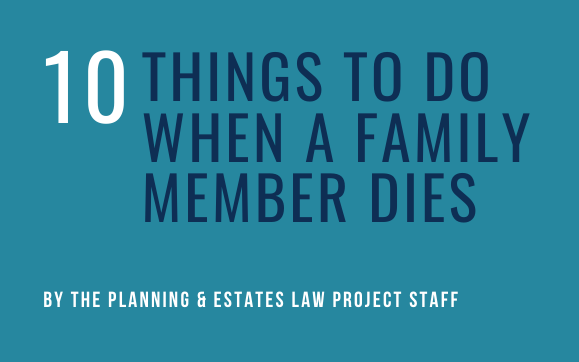Justice Center News
The Justice Center News blog features our advocacy on issues affecting low-income New Yorkers today and the latest CBJC happenings. For press releases, click here. For publications, click here.

10 Things to Do When a Family Member Dies
by CBJC Staff February 17, 2015
Editor’s Note: This article was updated on March 23, 2020
As anyone who has been through it knows, the stress of losing a family member is compounded by the details that must be attended to in its wake. Following is a checklist that could be helpful to many families:
- When making funeral arrangements, keep a copy of the funeral bill marked “paid.”
- Request a minimum of three death certificates from the funeral home.
- Safeguard and inventory the deceased’s personal belongings.
- Search the deceased’s home for important items and papers, including a will, bank statements, safe deposit box key, and post office box key.
- If you locate a will, determine whether it is the original will or a copy. IF YOU LOCATE AN ORIGINAL WILL DO NOT UNSTAPLE IT. Keep the will in a safe place. If you locate a copy of the will, try to locate the original, including by reviewing the will to determine whether the signing of the will was overseen by an attorney. If an attorney is identified, contact the attorney to determine whether the attorney has the original will.
- Make arrangements for the collection or forwarding of the deceased’s mail. The deceased’s mail should be routinely reviewed to determine whether the mail discloses any of the deceased’s assets.
- Determine whether the deceased had a pension, individual retirement account, or life insurance policy. Contact the institution to determine whether the deceased named a beneficiary of the pension, account, or policy.
- Make a list of the deceased’s closest family members.
- Notify or contact social security, the Veteran’s Administration (if applicable), and the deceased’s employer to determine whether death or survivor benefits are available.
- If you are low-income, contact the Planning and Estate Law Project – PELP – at the City Bar Justice Center for help probating the deceased’s will or petitioning for letters of administration to handle the deceased’s estate if a will cannot be located for the deceased.
When a Family Member is Very Sick, Terminally Ill or Incapacitated
It is best to address personal estate planning matters and obtain information and documents when a family member is living and competent. Ascertain whether the family member has a will, health care proxy, power of attorney, or direction regarding organ donation or disposition of remains. If the family member has any of these documents, ascertain where the documents are and safeguard them. If the family member does not have any of these documents, have the family member contact PELP at the City Bar Justice Center for help in preparing these documents.
The City Bar Justice Center’s Planning and Estates Law Project (PELP) has helped low-income New Yorkers since 2013 with important legal issues when a family loses or is about to lose a loved one. To contact The Planning & Estates Law Project, call 212-382-6756.
Recent posts
-
April 19, 2024
Statement of the Executive Director of the City Bar Justice Center Opposing IOLA Diversion and the Undermining of Complementary Public Service Programs
The City Bar Justice Center strongly opposes the inclusion in the FY2024-25 New York State budget of an eleventh-h...
Read more -
April 18, 2024
Corporate Transparency Act: What Small Businesses Need to Know
This article will break down the Corporate Transparency Act (CTA), which went into effect on January 1, 2024, that...
Read more -
April 9, 2024
The City Bar Justice Center’s 2024 Gala Celebrates Pro Bono Around the World, Raising Nearly $1.2 Million to Support New Yorkers in Need
On Wednesday, April 3, 2024, the City Bar Justice Center held its 19th Annual Gala, Pro Bono for Our World, at the...
Read more














